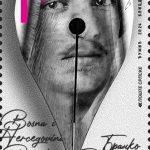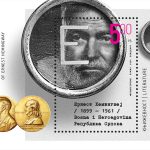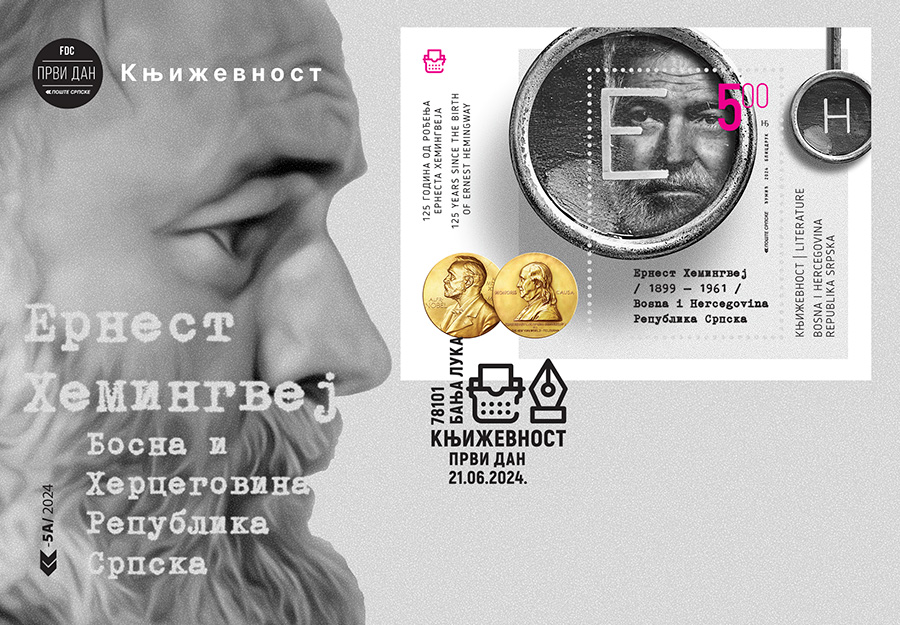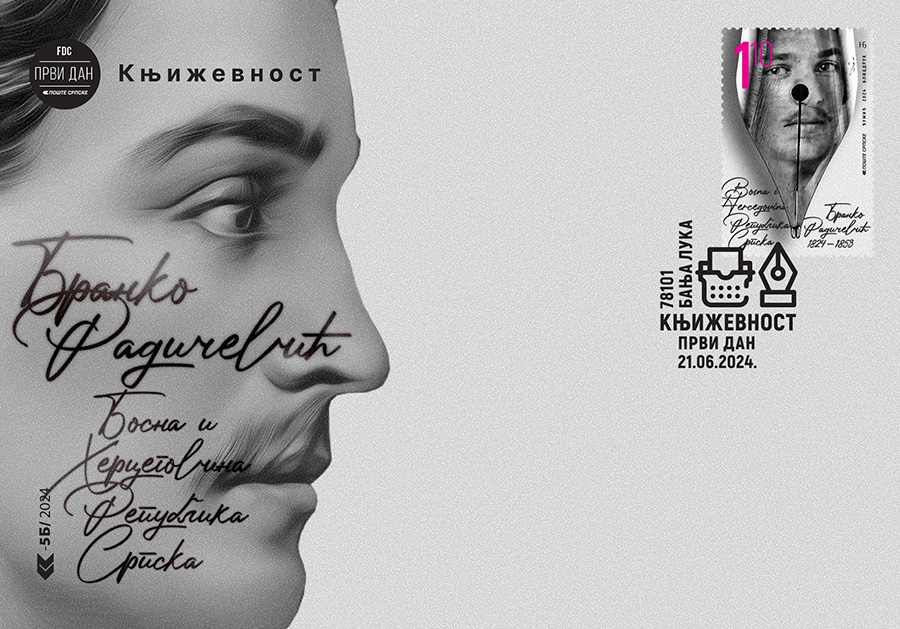Literature 2024
Title::Literature
Date of Issue: 21.06.2024.
Author: Nebojsa Djumic
Type edition: commemorative
Printing techniques: multicolour offset
Sheet: табак 8+1 и блок
Paper: muflep 100g
Printing House: Blicdruk, Sarajevo
 Motive: Branko Radicevic
Motive: Branko Radicevic
Catalogue no.: 967
Perforation: 13 3/4
Face value: 1.10 BAM
Quantity: 8 000
 Motive: Ernest Hemingway
Motive: Ernest Hemingway
Catalogue no.: 968
Perforation: 13 3/4
Face value: 5,00 BAM
Quantity: 8 000

Literature is the most diverse, versatile and complex form of art. The name itself is derived from book. Literature does not reject psychology, history, or religion - it absorbs everything that is sensory, experiential, and abstract.
The subject of literature is reality, phenomena and everything that happens in it, and most of all man and his feelings, experiences, desires, hopes, views on the world, in a word, his entire inner and social life. By depicting the objective reality in pictures, the writer in fact presents his experience of that reality, his attitude towards it. Every phenomenon and detail taken from reality and brought into the work are imbued with the writer's imagination, feelings, and thoughts, which is why they acquire a subjective character, and become a new world - artistic and unrepeatable.
Branko Radicevic also brought this artistic world, freshness and personal feelings with his poetry. He belongs to the most important poets of Serbian romanticism. With Branko Radicevic, poems with distinctly lyrical motifs and mood entered national literature for the first time. Those songs primarily sang about the joy and beauty of youth. Nevertheless, Radicevic wrote most of his poems, such as "When I thought I would die" or "Student farewell" as elegies (sad poems). He found sources and inspiration in folk poetry. Along with Djura Danicic, he was the most loyal follower of Vuk's reform of the spelling of the Serbian language and the introduction of the vernacular into literature.

Literature is the most diverse, versatile and complex form of art. The name itself is derived from the word book. Literature does not reject psychology, history, or religion - it absorbs everything that is sensory, experiential, and abstract.
The subject of literature is reality, phenomena and everything that happens in it, and most of all man and his feelings, experiences, desires, hopes, views on the world, in a word, his entire inner and social life. By depicting the objective reality in pictures, the writer in fact presents his experience of that reality, his attitude towards it. Every phenomenon and detail taken from reality and brought into the work are imbued with the writer's imagination, feelings, and thoughts, which is why they acquire a subjective character, and become a new world - artistic and unrepeatable.
One of the artists who attracted the audience with his writing style is the American novelist and journalist Ernest Hemingway, a well-known name in world literature. He was a very curious person, lived a turbulent life and loved to travel a lot. In his first works, he paid a lot of attention to characters who fight for morality, and yet, on the other hand, do not respect anyone's emotions except their own. Other characters were those people with simple emotions and characters. Until the 1930s, he mostly dealt with helpless characters, and after that he focused on social problems. He left behind timeless works, and the most read of all are "The Old Man and the Sea". The greatness of Hemingway's creativity is evidenced by numerous awards such as the Pulitzer and the Nobel Prize, as well as the number of bought and rented novels he wrote. However, the biggest confirmation of his quality lies in the number of books and films that have been made about his character and work.



